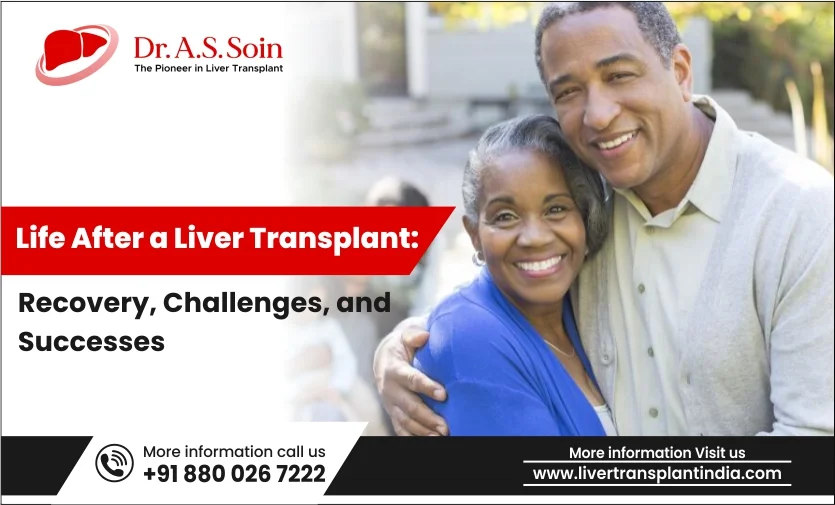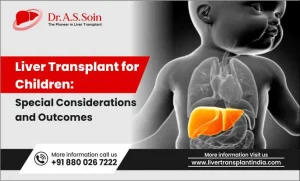A liver transplant is often the last option for those battling severe liver diseases. This intricate procedure involves replacing a damaged liver with a healthy one, usually from a deceased donor. Although this surgery can be life-saving, the journey continues well beyond the operating room. The post-transplant recovery phase is critical and comes with its own set of challenges. Dr. A. S. Soin’s blog is designed to help you understand what to expect after a liver transplant, focusing on the recovery process, potential hurdles, and the milestones you can achieve over time.
Table of Contents
ToggleThe Critical Post-Transplant Phase
The immediate period following a liver transplant is vital, as your body begins to adjust to the new organ, laying the groundwork for long-term recovery.
- Hospital Recovery: The First Steps
After surgery, you will spend the initial days in the Intensive Care Unit (ICU). Your hospital stay typically ranges from 1 to 2 weeks, depending on how swiftly you recover and how well your body adapts to the new liver. During this time, your medical team will closely monitor your vital signs, liver function, and overall health to ensure everything is on track.
It’s common to feel a mix of emotions—relief, anxiety, or even fear—during these early days. These feelings are entirely normal as your body adjusts and the reality of your surgery begins to set in.
- Physical Recovery: What Lies Ahead
Physically, your body will need time to recover from such a major surgery. The first few weeks are often focused on managing pain, as the surgery involves a large incision that needs time to heal. Your healthcare team will guide you on pain management and when to start gentle movements. Early mobility exercises, such as walking, are encouraged to prevent complications like blood clots and to promote circulation.
You may also face some complications during this period, such as infections or bile duct issues. These are generally managed with medications or minor procedures, but they can extend your recovery time. It’s crucial to stay in close communication with your healthcare team and follow their guidance carefully.
- Returning Home: Embracing a New Routine
Going home after a liver transplant is a major milestone, but it also marks the beginning of a new phase of self-care and lifestyle adjustments.
The Importance of Medications
Managing your medications is one of the most critical aspects of life after a transplant. Immunosuppressants are essential to prevent your body from rejecting the new liver. These medications work by suppressing your immune system to help your body accept the new organ. However, they come with potential side effects, such as increased vulnerability to infections and other health issues. You’ll need to take these medications for the rest of your life, and your medical team will help you manage the dosage and minimize side effects.
Dietary Changes
Your diet will play a key role in your recovery. After the transplant, your body requires proper nutrition to heal and function effectively. You may need to follow specific dietary guidelines to protect your new liver and maintain your overall health. This might involve reducing salt intake, avoiding alcohol, and ensuring a balanced diet rich in fruits, vegetables, and lean proteins. Staying hydrated is also important. Your dietitian will provide a personalized plan to help you navigate these dietary changes.
Emotional and Mental Well-being
The emotional journey after a transplant can be just as challenging as the physical one. It’s normal to experience a mix of gratitude, relief, and anxiety about the future. Some patients may also experience depression or anxiety during this time. Seeking mental health support, whether through therapy or support groups, can be incredibly beneficial. Having a strong support system of family and friends can also make a significant difference. Staying positive and motivated, even on tough days, is crucial.
Long-Term Recovery: Living with a New Liver
As you settle into life with a transplanted liver, your focus shifts to long-term recovery, which involves ongoing care, lifestyle changes, and adapting to a new reality.
Regular Medical Check-ups
Routine follow-ups with your healthcare team are essential to monitor the health of your new liver and your overall well-being. These check-ups typically include blood tests, imaging studies, and sometimes liver biopsies to ensure the liver is functioning properly. Early detection of any issues, such as organ rejection or infections, allows for timely intervention and better outcomes.
Lifestyle Adjustments
Living with a transplanted liver requires some long-term lifestyle changes. It’s essential to avoid alcohol entirely, as it can harm your new liver. Managing stress is also important, as high stress levels can negatively affect your immune system and overall health. Regular physical activity, like walking or light exercise, is encouraged to keep your body strong and healthy. While these lifestyle changes may be challenging at first, they can greatly improve your quality of life after the transplant.
Setting Realistic Expectations
It’s important to understand that life after a liver transplant may differ from life before your illness. You may face certain limitations, and it’s essential to manage your expectations accordingly. Some patients return to work and lead active lives, while others may need more time to adjust. Hearing stories from others who have undergone similar experiences can be encouraging, offering insights into how to adapt and find a new normal.
Overcoming Challenges
While many liver transplant patients go on to lead healthy lives, the journey is not without its difficulties.
Dealing with Rejection and Complications
One of the main concerns after a transplant is the risk of organ rejection. Your immune system naturally tries to attack anything foreign, including a new liver. That’s why immunosuppressants are so important. However, even with medication, there’s always a risk of rejection. Symptoms of rejection can include fever, fatigue, and changes in liver function tests. Early detection and treatment are key to managing rejection, but it remains a concern throughout your life.
Other complications, such as infections or bile duct issues, can also occur. These problems often require additional treatments or procedures, adding to the complexity of recovery.
Financial and Social Considerations
Post-transplant care can be expensive. The cost of medications, follow-up appointments, and any additional treatments can create a financial burden. Navigating insurance coverage and managing these costs can be stressful. Socially, you may face challenges as well, such as returning to work, coping with fatigue, or dealing with social stigma related to organ transplants. It’s important to seek out resources and support to help manage these challenges.
Tips for a Successful Recovery
Recovering from a liver transplant is a long journey, but with the right approach, it can lead to a fulfilling life.
- Stay Positive and Patient: Maintaining a positive mindset and being patient with your recovery is crucial. Progress can be slow, and there may be setbacks, but focusing on small victories can keep you motivated.
- Listen to Your Body: While staying active is important, it’s equally essential to listen to your body. Don’t push yourself too hard, and take time to rest when needed.
- Prioritize Sleep: Quality sleep is vital for recovery. Create a restful environment, limit screen time before bed, and establish a consistent sleep routine to help your body heal.
- Keep a Health Journal: Track your daily symptoms, mood, diet, and exercise. This journal can be a valuable tool for identifying patterns and discussing concerns with your healthcare provider.
- Monitor Your Health: Be proactive about your health. Regular medical check-ups and prompt attention to any signs of complications can make a significant difference in your long-term recovery.
- Balance Fluid Intake: While staying hydrated is important, overconsumption of fluids can stress the liver. Consult with your healthcare provider to determine the right amount of fluid intake for your condition.
- Avoid Exposure to Illness: With a weakened immune system, even common colds can lead to severe complications. Limit contact with sick individuals, especially during flu season, and practice good hand hygiene.
- Educate Your Support System: Ensure your family and close friends understand your condition and the precautions you need to take. This will help them support you better and avoid actions that could inadvertently compromise your health.
By following these tips and the advice of your healthcare team, you can help ensure a smoother recovery and a better quality of life after your liver transplant.
Conclusion
The recovery period after a liver transplant is a crucial time that sets the stage for the rest of your life. While it’s filled with challenges, it also offers the opportunity for significant success and a renewed sense of life. Remember, you don’t have to navigate this journey alone. Dr. A.S. Soin and his team are here to support you every step of the way, ensuring you receive the best care throughout your recovery. Stay positive, stay informed, and take each day as it comes. The road ahead may be long, but with patience and determination, it can lead to a brighter, healthier future.








